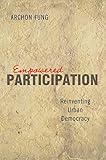Empowered Participation : Reinventing Urban Democracy / Archon Fung.
Material type: TextPublisher: Princeton, NJ : Princeton University Press, [2009]Copyright date: ©2004Edition: Course BookDescription: 1 online resource (304 p.) : 21 line illus. 12 tablesContent type:
TextPublisher: Princeton, NJ : Princeton University Press, [2009]Copyright date: ©2004Edition: Course BookDescription: 1 online resource (304 p.) : 21 line illus. 12 tablesContent type: - 9780691126081
- 9781400835638
- 352.16
- online - DeGruyter
- Issued also in print.
| Item type | Current library | Call number | URL | Status | Notes | Barcode | |
|---|---|---|---|---|---|---|---|
 eBook
eBook
|
Biblioteca "Angelicum" Pont. Univ. S.Tommaso d'Aquino Nuvola online | online - DeGruyter (Browse shelf(Opens below)) | Online access | Not for loan (Accesso limitato) | Accesso per gli utenti autorizzati / Access for authorized users | (dgr)9781400835638 |
Browsing Biblioteca "Angelicum" Pont. Univ. S.Tommaso d'Aquino shelves, Shelving location: Nuvola online Close shelf browser (Hides shelf browser)

|

|

|

|

|

|

|
||
| online - DeGruyter The Handbook of Economic Sociology : Second Edition / | online - DeGruyter Embattled Garrisons : Comparative Base Politics and American Globalism / | online - DeGruyter New Wealth for Old Nations : Scotland's Economic Prospects / | online - DeGruyter Empowered Participation : Reinventing Urban Democracy / | online - DeGruyter Ethnic Politics in Europe : The Power of Norms and Incentives / | online - DeGruyter For All These Rights : Business, Labor, and the Shaping of America's Public-Private Welfare State / | online - DeGruyter Richard Nixon : Speeches, Writings, Documents / |
Frontmatter -- Contents -- Figures and Tables -- Preface -- Abbreviations -- 1. Democracy as a Reform Strategy -- 2. Down to the Neighborhoods -- 3. Building Capacity and Accountability -- 4. Challenges to Participation -- 5. Deliberation and Poverty -- 6. Deliberation in Social Conflict -- 7. The Chicago Experience and Beyond -- Notes -- Selected Bibliography -- Index
restricted access online access with authorization star
http://purl.org/coar/access_right/c_16ec
Every month in every neighborhood in Chicago, residents, teachers, school principals, and police officers gather to deliberate about how to improve their schools and make their streets safer. Residents of poor neighborhoods participate as much or more as those from wealthy ones. All voices are heard. Since the meetings began more than a dozen years ago, they have led not only to safer streets but also to surprising improvements in the city's schools. Chicago's police department and school system have become democratic urban institutions unlike any others in America. Empowered Participation is the compelling chronicle of this unprecedented transformation. It is the first comprehensive empirical analysis of the ways in which participatory democracy can be used to effect social change. Using city-wide data and six neighborhood case studies, the book explores how determined Chicago residents, police officers, teachers, and community groups worked to banish crime and transform a failing city school system into a model for educational reform. The author's conclusion: Properly designed and implemented institutions of participatory democratic governance can spark citizen involvement that in turn generates innovative problem-solving and public action. Their participation makes organizations more fair and effective. Though the book focuses on Chicago's municipal agencies, its lessons are applicable to many American cities. Its findings will prove useful not only in the fields of education and law enforcement, but also to sectors as diverse as environmental regulation, social service provision, and workforce development.
Issued also in print.
Mode of access: Internet via World Wide Web.
In English.
Description based on online resource; title from PDF title page (publisher's Web site, viewed 30. Aug 2021)


